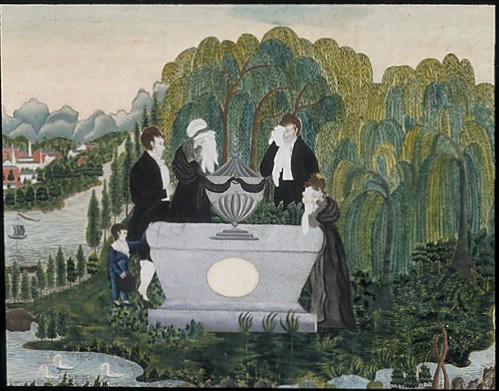Jude Knight's Blog, page 133
March 5, 2016
Sunday retrospective
 Did I really do a post a day for the first week of November 2014? Maybe it was because I was editing, and practicing avoidance. I even posted about that in a post called Procrastibaking.
Did I really do a post a day for the first week of November 2014? Maybe it was because I was editing, and practicing avoidance. I even posted about that in a post called Procrastibaking.
It was all about the editing for me that week, with three posts on the topic:
The real work is all in the edit quoted from Kurt Vonnegut: “We have to be continually jumping off cliffs and developing wings on the way down.”
Pulling all the threads together was my post about the next step after the analysis—the step I’m on now with Embracing Prudence.
He was drunk, but not nearly drunk enough gave an excerpt from my brand new prologue, carved wholesale out of what had once been chapter one.
The day I finished the edit, I linked to some random thoughts about writing from Christina Dodd.
Another post that week was a brief glossary of terms for budding romance novelists.
And the last post I want to direct your attention to today was called Is that a rooster in your pocket? Yes, it’s a brief and cheeky discussion of historically accurate inappropriate language, with some links to some superb resources.



March 2, 2016
Make ’em laugh, make ’em cry – emotional scenes on WIP Wednesday

Never Kiss a Toad is set at the beginning of the Railway Age
It’s our job to pull our readers out of their world and into the one we’ve created: to, as I say above, thrill, intrigue, and delight. In this week’s work in progress Wednesday, your challenge is to find me a scene that provokes a strong emotion in your readers: laughter, sorrow, fear. You choose.
I’ve chosen one from Never Kiss a Toad. This is a tender moment between Sally and her father, one that ends all too soon. Does it work?
“Can you spare a minute for your Papa, Sally?” he asked.
“Of course.” She followed him through to his study.
“You always seem to be hurrying somewhere, sweetheart,” he said. “I miss having my little princess curled up in a chair in my study, keeping me company.”
It was true, she realised. Before her debut, she had sought her father out whenever she could escape the schoolroom. Since she came out… “I have so much on, Papa,” she said. But it was Toad’s exile that came between them, even more since her father began believing lies about him. They were lies. They had to be lies.
Papa smiled, sadly. When had the last of his hair faded to grey? “I know, my love. You are very popular. If a sennight goes by and I do not receive an application for your hand, I know to expect two the following week. Am I to expect a visit from Lord Elfingham? He would make a fine husband, Sally.”
She suppressed a surge of fury. Papa should know that she waited for one proposal, and one only. Would he even tell her if it came? No. That was unfair. Papa had said from the beginning that he would not choose her husband, but would allow her to make the decision.
“He will make Henry a fine husband, Papa, when her mourning is over. If she will accept him. She has this notion that she is not fit to be a duchess because of her mother’s… Um.” Oh dear. She had not meant to discuss that with Papa of all people.
“Henrietta, is it? I hoped it was you, Sally.”
“We decided early on that we would not suit, Papa. It has always been Henry for Elf.” And Toad for Sally.
“You shall be nineteen soon, sweetheart. What would you like for your birthday?”
“Toad to be allowed home.” She had not meant to say that out loud. Her father flinched as if she had hit him, and his eyes, before he hid them by turning away, were pools of pain.
“I know you miss your childhood friend, my darling, but he… He is not as you remember him. If he came back you would suffer for it, and neither his parents or yours are prepared to risk that.”
“You say that, Papa, but you will not tell me how he has changed. You won’t give me any real reasons. And I do not believe it, Papa. Someone has been telling you lies. I know him, and I know you are wrong.”
He had his face shuttered again when he turned back to her, the cold ducal mien that she never used to see before the day it all changed. “You must trust that we know what is best for you, Sarah.



February 29, 2016
Go wash out your mouth!
Historic romance authors, like a microcosm of society at large, vary in their approach to the expletives they put in their characters’ mouths. Some happily use the swearwords common in the 21st century; some go for non-offensive and archaic; some true for realism, however odd it might sound to our modern ears.
If you are a writer or a reader in the later camp, you’ll love this article from Salon. (It’s from 2013, but new to me.) A swear word, by their definition, is a word that is not intended to carry a literal meaning, but is intended to shock, offend, and otherwise arouse emotion.
The Dictionary of the Vulgar Tongue (subtitled A DICTIONARY OF BUCKISH SLANG, UNIVERSITY WIT, AND PICKPOCKET ELOQUENCE), published in 1795 and updated in 1811, is a great resource if you want to know what words were in use in England in the early 19th Century. Here’s the foreword.
The merit of Captain Grose’s Dictionary of the Vulgar Tongue has been long and universally acknowledged. But its circulation was confined almost exclusively to the lower orders of society: he was not aware, at the time of its compilation, that our young men of fashion would at no very distant period be as distinguished for the vulgarity of their jargon as the inhabitants of Newgate; and he therefore conceived it superfluous to incorporate with his work the few examples of fashionable slang that might occur to his observation.
But our Jehus of rank have a phraseology not less peculiar to themselves, than the disciples of Barrington: for the uninitiated to understand their modes of expression, is as impossible as for a Buxton to construe the Greek Testament. To sport an Upper Benjamin, and to swear with a good grace, are qualifications easily attainable by their cockney imitators; but without the aid of our additional definitions, neither the cits of Fish-street, nor the boors of Brentford would be able to attain the language of whippism. We trust, therefore, that the whole tribe of second-rate Bang Ups, will feel grateful for our endeavour to render this part of the work as complete as possible. By an occasional reference to our pages, they may be initiated into all the peculiarities of language by which the man of spirit is distinguished from the man of worth. They may now talk bawdy before their papas, without the fear of detection, and abuse their less spirited companions, who prefer a good dinner at home to a glorious UP-SHOT in the highway, without the hazard of a cudgelling.
But we claim not merely the praise of gratifying curiosity, or affording assistance to the ambitious; we are very sure that the moral influence of the Lexicon Balatronicum will be more certain and extensive than that of any methodist sermon that has ever been delivered within the bills of mortality. We need not descant on the dangerous impressions that are made on the female mind, by the remarks that fall incidentally from the lips of the brothers or servants of a family; and we have before observed, that improper topics can with our assistance be discussed, even before the ladies, without raising a blush on the cheek of modesty. It is impossible that a female should understand the meaning of TWIDDLE DIDDLES, or rise from table at the mention of BUCKINGER’S BOOT. Besides, Pope assures us, that “VICE TO BE HATED NEEDS BUT TO BE SEEN;” in this volume it cannot be denied, that she is seen very plainly; and a love of virtue is, therefore, the necessary result of perusing it.
The propriety of introducing the UNIVERSITY SLANG will be readily admitted; it is not less curious than that of the College in the Old Bailey, and is less generally understood. When the number and accuracy of our additions are compared with the price of the volume, we have no doubt that its editors will meet with the encouragement that is due to learning, modesty, and virtue.



February 28, 2016
Sunday retrospective
 Today’s Sunday retrospective reaches back to the second half of October 2014, when I was writing the last third of Farewell to Kindness. I was reporting progress—and hiccups—as I went. I finished the month with a photo of the printed first draft of Farewell to Kindness and the heading #amediting. A couple of days before that, I posted a list called ‘Editing the book’ — everything I needed to do between finishing the first draft and sending the book for beta reading.
Today’s Sunday retrospective reaches back to the second half of October 2014, when I was writing the last third of Farewell to Kindness. I was reporting progress—and hiccups—as I went. I finished the month with a photo of the printed first draft of Farewell to Kindness and the heading #amediting. A couple of days before that, I posted a list called ‘Editing the book’ — everything I needed to do between finishing the first draft and sending the book for beta reading.
Criminal injustice was the post I wrote when I found out about the sea change in the British criminal justice system, and how this affected my plot. In 1807, the old system was no longer working and the new system had not been invented.
Our modern view is that one law should apply to all. It doesn’t always work. Money buys better lawyers, for a start. But the basic principle is that we have laws that lay down the crime and the range of punishments, and judges who look at the circumstances and apply penalties without fear or favour.
The pre-19th century situation in England was far, far different.
I also posted on why I changed the name of my heroine in Farewell to Kindness in a blog post with the longest titleI have ever written: Ewww, just ewww: or the cautionary tale of the perils of naming characters in a whole lot of books at once and then starting one without reference to the real world.
I waxed philosophical about romance writing as a genre in a couple of posts that largely picked up what other people were saying:
Fear of vulnerability reports on research that suggests fear of vulnerability underpins the common dismissal of the romance genre by readers of other types of fiction
Romance novels are feminist novels has excerpts from a much longer article that directly confronts the view that all romance novels are trivial, and turns it on its head.
The first review I published on my website was for the wonderful Lady Beauchamp’s Proposal. Four months later, I was thrilled to find author Amy Rose Bennett as another potential Bluestocking Belle, and we’ve been colleagues and allies ever since.
And I also published a review of Darling Beast by Elizabeth Hoyt. In less than a fortnight, I’m hosting a Belles’ Book Club discussing another of the Maiden Lane series, Scandalous Desires. Elizabeth has agreed to pop in for an hour, so don’t miss it. You can join the event here: https://www.facebook.com/events/929180810491602/



February 24, 2016
Fights in WIP Wednesday

In the summer of 1892, Princess Pauline von Metternich was the Honorary President of the Vienna Musical and Theatrical Exhibition and Countess Anastasia Kielmannsegg was the President of the Ladies’ Committe of the Exhibition, and the two clashed over some of the arrangements for the Exhibition. (Several sources claim it had something to do with the floral arrangements.) Heated words were exchanged, and the two women agreed to settle their differences with a duel.
Today on work-in-progress Wednesday, I’m looking for fights. Physical or verbal. Arguments, fisticuffs or sword fights. Between any of your characters. Your choice.
Fights punctuate the action and ratchet up the tension. And talkative fighters let things slip in their anger, which can be very handy for driving the plot.
My piece is from Embracing Prudence: a confrontation between my hero David and his half-brother the Marquis of Aldridge.
“I won’t let you hurt her again, Aldridge.”
“Your turn, is it?” Aldridge mocked. “Who are you to judge me? You’re swiving her, too.”
“She was an innocent when she met you, Aldridge.”
“She would not have stayed one, Wakefield. She was ripe to fall. If it had not been me it would have been one of the others, and they would not have waited to make sure she enjoyed it.”
David’s punch caught him by surprise.
“She did not enjoy being abandoned in a prison for a week, you self-centred, spoilt, idiot.”
Aldridge shook his head to clear it. “I will concede that was not one of my finest moments. I told them to treat her with every consideration. I found out later that the King’s man thought me a fool in the toils of a scheming woman, and countermanded my orders. By then she was gone, though.” He frowned. “I’ll never understand why. I would have given her anything she wanted, showered her with presents, set her up in style…”
“Anything except your name.”
Aldridge’s eyes widened at David’s comment. “She did not honestly think I meant marriage, did she? I could not marry a nobody, and one who wasn’t even pure.”
David punched him again



February 21, 2016
Sunday retrospective

Backwards Clock
I was a busy blogger in October 2014, and some of what I wrote about might be worth a second look.
I reported on research:
Everything you needed to know about the dances at Regency assemblies and balls.
The wonderful history and the rules of mob football, with a video link to a modern day survival.
My pet peeve — regencies with more dukes that the entire peerage of England contained, and every one of them single and handsome (and what the real statistics were).
The fascinating history of wheelchairs (Did you know that one of the earliest self-propelled was invented shortly after the inventor demonstrated one of the earliest pairs of roller skates?)
My favourite resource for what was actually in the news in England in any given year.
I also wrote about
why I blog and how
where my ideas come from (using Candle’s Christmas Chair as a case study)
And that just brought us to the middle of the month.
There were a few process and excerpt posts in there, too. Take a look around. Enjoy.
I’ll leave you with the contents of my post on having a jackdaw mind.
Elizabeth Boyle writes on synchronicity in the writing process; something I’m experiencing every day as I write Farewell to Kindness, and pieces go ‘click’.
…in writing, it is often a sort of synchronicity of pieces: a treasure exhibit, a line from a biography, and a literature degree that left me with a profound love of myths. None of them are truly connected, but they all came together for this story. I have come to believe that nothing in life is inconsequential. It all has value eventually. Just keep your eyes and imagination open.
At last, my jackdaw mind is finding a use for all those shiny facts and snippets.



February 17, 2016
First kisses on WIP Wednesday
Today, I’m featuring first kisses. With four works-in-progress underway at the same time, I have a few to choose from. Two of them are not at all far along, but I was in a party on Facebook where kisses were the theme of the day, so I wrote a kiss scene for each.
Below is the first kiss between Alex Redepenning and Ella Melville, hero and heroine of A Raging Madness, the second Golden Redepenning book. How about showing me yours?
In A Raging Madness, Alex Redepenning is rescuing the widow Eleanor Melville from her scheming relatives. Alex and Ella are fighting the attraction between them. I haven’t yet written as far as their first kiss, but I’m guessing it is going to go something like this:
“How is your leg?” she said, doing a creditable job of keeping her voice steady. Alex could not be so calm. He had nearly lost her!
She knelt beside him looking anxiously at the pernicious limb. To hell with the leg. “Ella!” She turned her head to meet his eyes. He said it again, his voice breaking. “Ella.”
Her eyes full of wonder, she lifted her hand to touch his face, and he noticed the holes in the crown of her hat.
“Your hat!” he managed. She untied and unpinned it; removed it and poked a finger into one hole and then the other.
“The bullet went through my hat!” She sounded surprised, but not alarmed.
“Too close.” Unable to bear the distance, he tugged her into his arms. “Too close, Ella.” He folded her close and tucked his face into her hair.
She pulled back, warning him, “Alex, be careful of your leg!” Her face turned up to him tempted him beyond measure, and he covered her mouth with his, the thwarted desire of a decade or more released by the fear of the last half hour.
Damn the leg, he would have said, but her mouth had risen to meet his, and he had no breath for speech; no mind with which to think. In all the universe, there was only Ella.



February 14, 2016
Sunday retrospective
 In this new regular feature, I’m going to link to posts from a year ago or more: sometimes mine, sometimes those I’ve commented on.
In this new regular feature, I’m going to link to posts from a year ago or more: sometimes mine, sometimes those I’ve commented on.
Today, I’m looking at September in 2014, when I chatted a bit about what I was doing (let’s not worry about that) but also wrote about the price of sugar in 1807 (and how I found out what it was) and the difficulties in finding out about seating etiquette at a formal late-Georgian dinner.
The timeline of stories that I posted remains accurate, though I’ve added some and changed the order in which I am writing.
And I asked my few readers way back there at the beginning of my blogging what they thought about lo-o-o-o-ng books, since I appeared to be writing one.
And I wrote a post that read:
“Elyse writes in defence of romance novels on Smart Bitches Trashy Books.
In the end, it doesn’t matter what I read. It doesn’t even matter that I do read, quite frankly. What matters is that we live in a world where fiction aimed directly at women is perceived as garbage. That doesn’t say anything at all about me, it says a lot about what needs to change.
I’ve quoted the last paragraph, but read the whole thing. Cheers and cookies, Elyse.”



February 11, 2016
Valentine’s Day contest
Join the Bluestocking Belles Valentine hunt. Match the heroes with their heroines to be entered in a draw for their book. For entry details, see http://bluestockingbelles.com/valentines/ #BellesBrigade #Valentines #BellesInBlue



February 9, 2016
Backstory on WIP Wednesday
 We writers know a whole heap of stuff about our characters that never makes it into the final novel. We call it backstory, and every rounded character has one. The art is to trickle out just the facts the reader needs without making it boring, while hinting at further depth underneath.
We writers know a whole heap of stuff about our characters that never makes it into the final novel. We call it backstory, and every rounded character has one. The art is to trickle out just the facts the reader needs without making it boring, while hinting at further depth underneath.
So this week on WIP Wednesday, show me your backstory. It could be a scene that you have decided not to use, or it could be the trickle of facts that will probably make it all the way through to the final draft.
Whether the passage that follows will survive editing I don’t know. It’s the first few paragraphs of A Raging Madness, and I wrote them yesterday.
The funeral of the dowager Lady Melville was poorly attended—just the rector, one or two local gentry, her stepson Edwin Braxton accompanied by a man who was surely a lawyer, and a handful of villagers.
Alex Redepenning was glad he had made the effort to come out of his way when he saw the death notice. He and Gervase Melville had not been close, but they had been comrades: had fought together in Egypt, Italy, and the Caribbean.
Melville’s widow was not at the funeral, but Alex expected to see her when he went back to the house. Over the meagre offering set out in the drawing room, he asked Melville’s half brother where she was.
“Poor Eleanor.” Braxton had a way of gnashing his teeth at the end of each phrase, as if he needed to snip the words off before he could stop chewing them.
“She has never been strong, of course, and Mother Melville’s death has quite overset her.” Braxton tapped his head significantly.
Ella? Not strong? She had been her doctor father’s assistant in situations that would drive most men into a screaming decline. She had followed the army all her life until Melville sent her home—ostensibly for her health, but really because she took loud and potentially uncomfortable exception to his appetite for whores. Alex smiled as he remembered the effects of stew laced with a potent purge.
Melville swore Ella had been trying to poison him. She assured the commander that if she wanted him poisoned he would be dead, and perhaps the watering of his bowels was the result of a guilty conscience. Ella was the closest to a physician the company had since her father died. The commander found Ella innocent.








